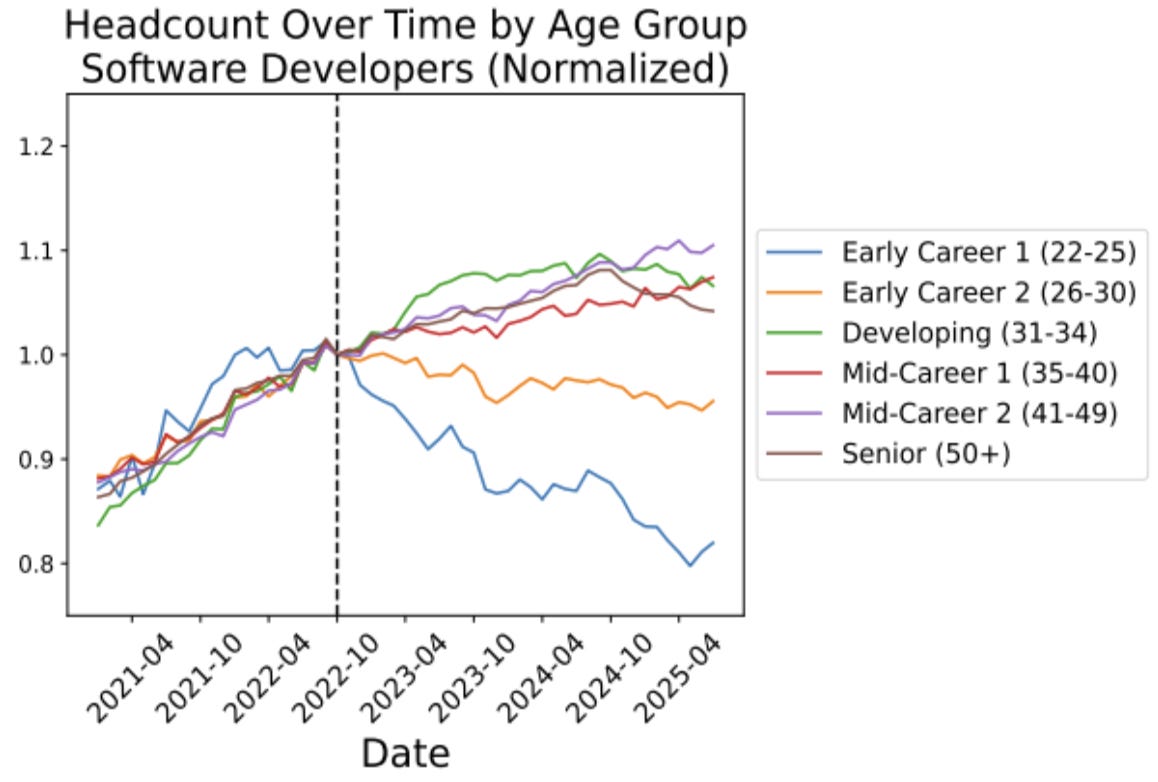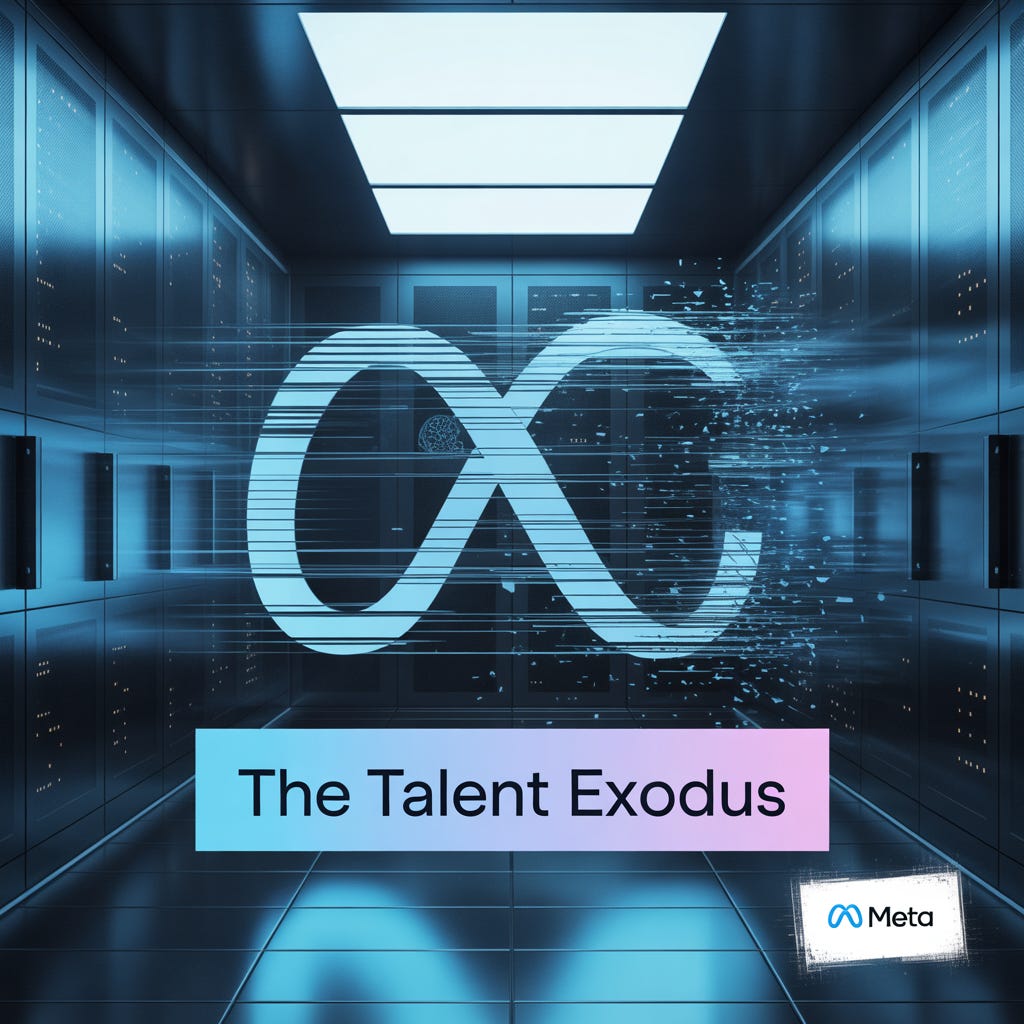👷♂️AI squeezes young workers
and: 🚶♀️Top AI Hires Flee Meta After Weeks on the Job
AI is making it harder to land a job, especially for entry-level positions. Sorry, college grads. Meanwhile, Starlink is pushing for more spectrum to challenge major carriers, and it might just succeed. Over at Meta, top AI talent is already fleeing, some straight back to OpenAI. What’s driving these shifts? Let’s dig in. Stay curious.
AI squeezes young workers
AI Tools -
Starlink and T-Mobile to Disrupt the U.S. wireless market
China's Response to This?
Top AI Hires Flee Meta After Weeks on the Job
📰 AI News and Trends
OpenAI’s plan to allow employees and former staff to sell $6 billion in private stock to investors was already slated to become one of the biggest such employee tenders in Silicon Valley history.
Google improves Gemini AI image editing with “nano banana” model. Gemini 2.5 Flash Image is currently atop LMArena's image-editing leaderboard.
Perplexity and French AI firm Mistral remain part of the M&A conversation within Apple
More people are turning to general-purpose chatbots for emotional support. Adam Raine, 16, used ChatGPT for schoolwork, but then he started discussing plans to end his life. His family is now suing OpenAI
🌐 Other Tech news
SpaceX completed a successful test flight of its Starship rocket, reversing a series of failed launches and putting the company back on track for a planned human mission to the Moon in 2027
Africa is going solar.. fast. African solar panel imports from China hit a record high
Eli Lilly has just released positive Phase III trial results for its experimental oral GLP-1 drug, orforglipron
Starlink and T-Mobile to Disrupt the U.S. wireless market
Starlink and T-Mobile are eyeing spectrum licenses owned by struggling EchoStar, parent of DISH Network. EchoStar holds one of the largest underused blocks of U.S. airwaves, long hoarded by chairman Charlie Ergen, but faces pressure from FCC Commissioner Brendan Carr to sell. Just as if Musk did not have enough leverage and power in the tech space, one of his companies can now position itself to be a main contender in the wireless market, obtaining more data from users, having more power to acquire government contacts, and more insight data to police users for government and company benefits. Here is how it breaks down:
T-Mobile: Initially sought nearly all EchoStar licenses and even considered a three-way deal with AT&T to split spectrum. It remains in talks for pieces AT&T didn’t buy.
Starlink: Interested in spectrum valued at around $30B. A cellular network would let it challenge AT&T, Verizon, and T-Mobile by combining satellites with mobile service.
Regulatory Pressure: Carr criticized EchoStar for “spectrum squatting,” noting airwaves meant for rural broadband have sat idle.
Industry Concerns: Analysts warn telecoms may be overextending, with returns from spectrum investments often failing to exceed costs. Pentagon leaders also worry about losing military bandwidth.
If Starlink succeeds, it could disrupt the U.S. wireless market by breaking the dominance of the Big Three carriers.
China's Response to This?
Meanwhile, on the other side of the world, China is moving fast on airwaves and satellites. Its Guowang megaconstellation, run by the state-backed and secretive China SatNet (founded 2021), is shaping up as more than just a Starlink rival.
The launch cadence has recently matched Starlink’s pace, signaling rapid scale-up. Built by multiple manufacturers and launched on diverse rockets, Guowang’s satellites operate at higher altitudes, meaning fewer units are needed for global coverage. Analysts warn the network could give the People’s Liberation Army (PLA) a tactical edge in Western Pacific conflicts by boosting secure communications and surveillance.
🧰 AI Tool
Productivity
Download our list of 1000+ Tools for free.
AI squeezes young workers
AI Is Hurting Young Workers’ Job Prospects
Stanford economists found that generative AI is erasing many entry-level jobs:
Software developers 22–25 saw headcount fall by ~20% since late 2022. Older developers, meanwhile, still gained jobs thanks to harder-to-automate skills.
Roles like reception, translation, and customer service show similar declines.
The Paradox here is that without entry-level work, it’s unclear how future experts will get trained.
The bright spot dwells in fields where AI acts as a helper (e.g., healthcare), and young workers saw above-average job growth.
Reader voices: “We’ve been here before with automation” … “If junior work vanishes, how do we train the next generation?”
🧰 AI Guides
Explore our AI Guides — from coding to photography and beyond, find step-by-step tips to put AI to work for you.
Top AI Hires Flee Meta After Weeks on the Job
Meta’s new Superintelligence Lab is already showing signs of trouble. Just two months after Mark Zuckerberg launched the initiative with sky-high recruiting offers, at least three researchers have resigned, two returning to OpenAI after less than a month, and one, Rishabh Agarwal, leaving for undisclosed reasons.
Meta is also losing longtime generative AI product director Chaya Nayak, who is joining OpenAI. The shake-ups raise questions about the lab’s stability despite Zuckerberg dangling nine-figure pay packages to lure talent. Meta has also been plagued by repeated AI team reorganizations and is now striking deals with startups like Midjourney to focus on AI-generated video for Facebook and Instagram. Meanwhile, OpenAI, despite criticizing Meta’s hiring spree, appears to be regaining key staff.




